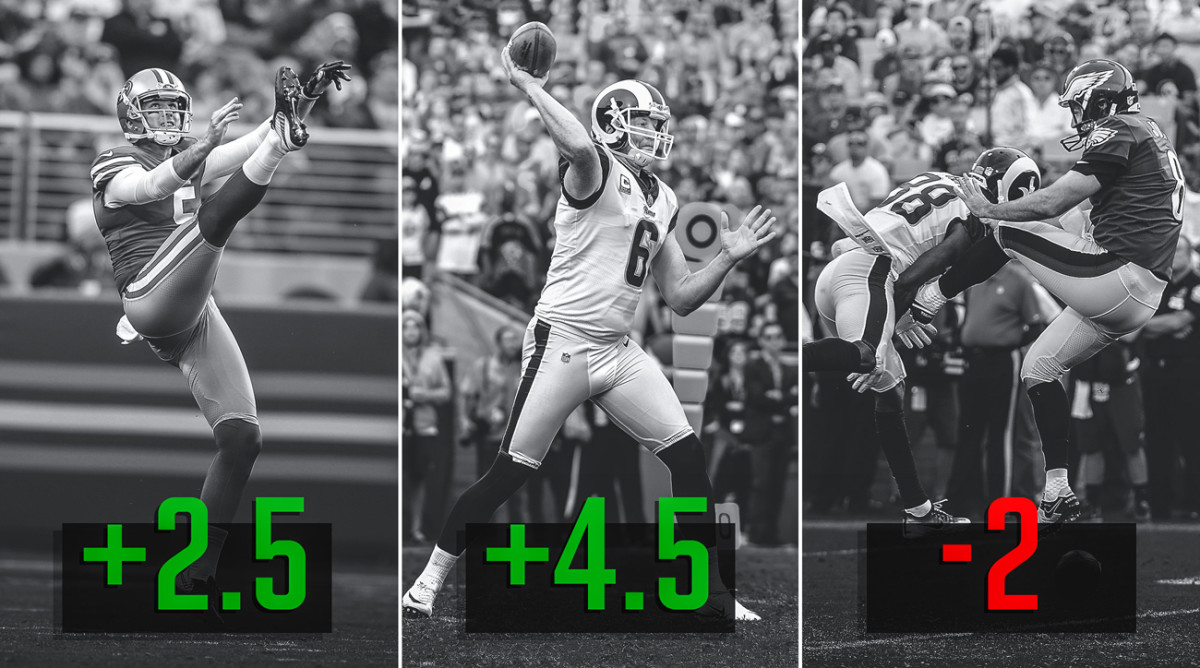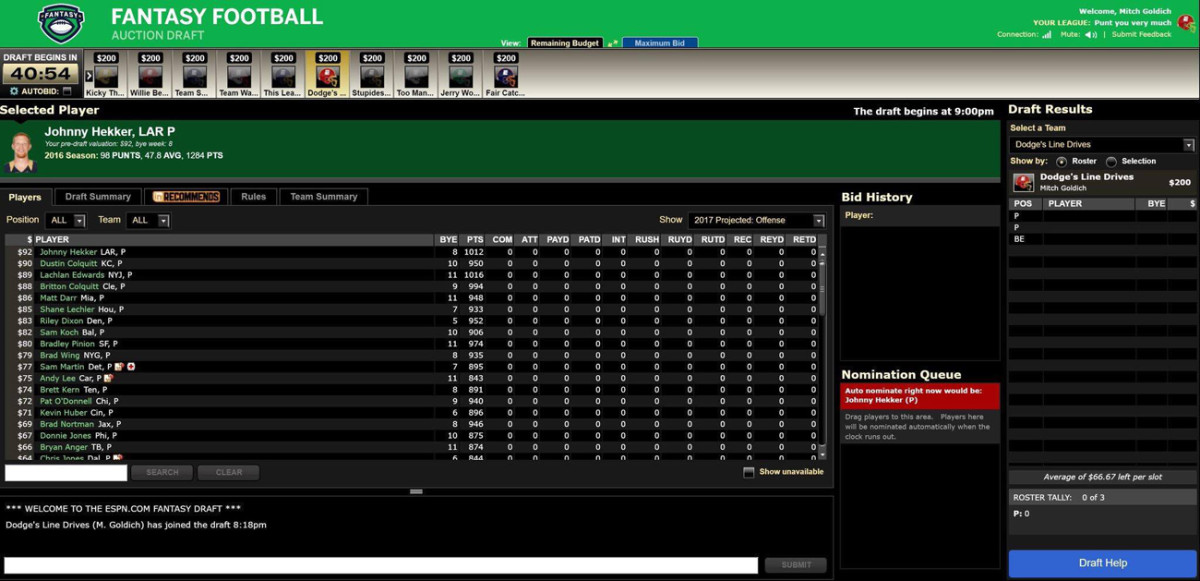Punters Deserve Fantasy Football Love. Believe It Or Not, Some Already Get It.

The ending at Lambeau Field on Monday night in Week 6 had plenty of drama, as Aaron Rodgers led another one of his signature comebacks, against the 49ers. While the Packers’ offense got its typical credit, the defense held strong in the fourth quarter too—twice forcing San Francisco’s Bradley Pinion onto the field to punt the ball away after successive three-and-outs.
As always happens at the end of Monday Night Football, fantasy matchups hung in the balance as well, with fans sweating out the final few plays made by Rodgers, Davante Adams, George Kittle and others.
Pretty much everyone with a chance to touch the ball had an impact on fantasy, from Kevin King’s interception to Mason Crosby’s game-winning field goal.
Everyone, that is, except for Pinion.
The Niners’ fourth-year special-teamer, who also holds for placekicks and handles kickoffs, has never known any another position. His grandfather was a punter; he got a football for Christmas one year, and the rest was history: Three years at Clemson, followed by a fifth-round selection by San Francisco.
Pinion played fantasy football growing up and remembers what it was like not to see his main position represented.
“I mean, it kind of sucked,” he says. He used to draft his fantasy kickers based on who his favorite punters held for, a practice his relatives still follow in the Pinion family league. “My whole family tries to draft Robbie Gould, and whoever gets Robbie first kind of says they got me.”

It’s a feeling Raiders punter Johnny Townsend can relate to. Townsend, who played safety in addition to punter on his high school team, remembers feeling the same limitations on his fantasy roster.
“My favorite players were always the punters,” he said. “Those were the guys I liked to watch the most, and tried to model my game after. And when you draft your fantasy teams, sometimes it’s hard not being able to pick some of your favorite players.”
As a generation of fans has come of age watching the Red Zone channel and following fantasy teams as closely as hometown teams, punters everywhere are a bit left out.
Rams punter Johnny Hekker was a quarterback and a punter growing up, so it never bothered him much. But, having given up signal-calling, it’s definitely on his mind now. “Being a punter in the NFL, you hear all your buddies say, ‘Oh man, I wish I could draft you in fantasy.’” he said. “You want to be represented there, but I get that it’s kind of a difficult position to put impactful numbers on.”
In a world with all kinds of variations on fantasy football, from superflex to best ball to guillotine leagues, you’d think at some point, somebody, somewhere would have said, Hey why not include punters?
Well, they have.
Few brave souls engage in the practice, but ESPN does actually offer the capability to add a punter to the rosters in fantasy leagues on their platform. It’s just that almost nobody does.
But luckily for guys like Pinion, Townsend, Hekker and others who want to expand the movement, one particularly dorky MMQB writer with perhaps a little too much time on his hands does happen to partake.
Yes, I’m proudly in an all-punters fantasy league.
You know how these ideas come about. Ten college buddies in a normal fantasy keeper league get together for the annual summer meeting to make trades and propose new legislation for the league constitution. (OK, maybe you don’t?)
After one beer: We should get rid of kickers.
After two beers: We should give each team two kickers.
After three beers: We should replace kickers with punters.
After four beers: We should have an entirely separate league that’s just punters.
And so that’s pretty much how the all-punter league was born. Numbers of beers are, uhh, approximate.
The league carries on, now in its seventh season. The 10 of us draft three punters each, and no other players. Each team starts two every week, with a third on the bench. Need proof? Here’s a screenshot from our 2017 auction draft.

So yes, it exists. For the last couple seasons we’ve even had projections, thanks to ESPN fantasy analyst Mike Clay.
“A couple years ago, I decided, ‘What the hell?’ ” Clay said. “I’m doing everything else. I might as well do all of the categories and give people the full picture. So I did a little research and here we are.”
To those about to voice grave concerns about how Clay spends his time, he clarified that he does not go in and manually draw up estimates for each individual punter. He has his much larger model, plugs in his usual data and then watches it spit out projections for every position from quarterback through punter.
But he still takes care to make sure his numbers look good.
“Essentially I do quality control for all the positions at the end,” Clay said. “If I see [the Patriots’] Ryan Allen as the No. 1 punter, I’d be like ‘OK something’s probably messed up here.’ But generally with the punters it’s pretty straightforward. It’s pretty heavy on how well the offense is going to perform.”
Early returns say punters are into the idea. I spoke to three, who all happily endorsed this movement. I asked them what stats they’d include, and each of them named punts inside the 20. Hekker and Pinion also mentioned the idea of bonus points for punts more than 50 or 60 yards. Pinion and Townsend wanted points for forcing fair catches, and subtracting out return yards or incorporating net yards.
Fortunately, all of those options already exist. My league gives out one point for each punt and tacks on points for yards, punts inside the 10 and 20, and fair catches. Then it subtracts points for blocked punts, touchbacks and return yards. At the end of the day, average distance computes to an additional point total on a scale, similar to how fantasy defenses typically gain or lose some number based on how many points they’ve allowed for the game.
One of the hard parts of popularizing these ideas with the masses gets back to what Clay said about the punters on bad teams landing at the top of the rankings. When it comes to playing time and opportunities to perform, the incentives for punters run counter to the team’s needs. For most other positions, points for the fantasy team are good for the regular team. But the punter is the one person on the team who spends the whole game on the sideline hoping not to get called into action.
Episodes 1 and 2 available now: An exclusive narrative podcast series from SI, re-examining the murder of Titans great Steve McNair. Subscribe on iTunes, or wherever you download your podcasts. And visit the podcast homepage for additional materials and updates.
Pinion’s 2017 season is actually a great example of this. Through the first 11 games he was one of the top punters in fantasy—thanks largely to his 5.6 punts per game. Unfortunately for Pinion’s fantasy owners, the 49ers went and traded for Jimmy Garopollo, and Pinion’s value cratered as he averaged only 2.6 punts per game in Jimmy G’s five starts.
“I will let that happen any time,” Pinion said when informed that he might have let some people down in last season’s fantasy playoffs. “I would much rather win games than get fantasy points.”
Hekker knows what it’s like too. He was the top punter in my fantasy league in both 2015 and 2016, two of his four All-Pro seasons. But this year the Rams punted just eight times in their first five games. Even despite a recent uptick, their 15 punts still ties the mark for the fewest through seven games of any team in history. And there’s Hekker, sitting at 32nd by the scoring settings in my league.
“Yeah, I’m gonna tell them to keep it rolling, baby,” Hekker said. “I’m more than happy just holding on PATs and field goals and having my one or two plays a game. It’s been awesome. I’m feeling fresh.”
Still, despite happily trading touchdowns for fantasy points, punters seem to like the idea of becoming fantasy commodities.
“That field position battle can be huge in the game,” Townsend said. “I think they can come up with a with a great system to work punters into it.”
While the three punters I spoke to would all prefer to be drafted individually like kickers, Pinion offered an outside-the-box idea—inasmuch as any of these other ideas would be considered “inside the box”—that punters could be included as part of the defense.
“The punt is kind of the first play of defense,” he said with paradigm-shifting simplicity. “If you included us in the defense, you could do average drive start, or things along those lines.”

But be careful what you wish for. Right now most NFL players have to deal with fans heckling them or blowing up their social media mentions because of fantasy production, even though a player’s sole focus is supposed to be on helping his real team and not others’ fantasy squads. The relative anonymity is a bit of a trade-off.
“I enjoy being left alone,” Hekker said. “I think not having that pressure, to have another grown man’s happiness riding on one of my punts kind of gives me a little more ease.”
“I’m pretty much in between on that,” Townsend said. “It could add a little bit more pressure, in terms of putting more of a spotlight on the position. But I think it would be a cool aspect to it.”
“A little bit of both,” Pinion said. “It’s nice not to have fans heckling you about that type of stuff. But look at [Seahawks’ rookie] Michael Dickson. The first game in his career, he had like a 57-yard net. That could change somebody’s league or somebody’s game for them in fantasy. That would be really cool to help a guy win fantasy.”
So for now, punters continue to toil in relative obscurity among those who follow the majority of the league mostly for fantasy reasons. Outside of ESPN, most platforms don’t offer the option to add punters, and of course most people wouldn’t think to do it even if they could. When a fan does try to talk to Hekker about fantasy, he usually assumes they’ve made a mistake.
“I’m always puzzled whether they really know what they’re talking about, or if they’re just saying that because they hear I’m a kicker, and they think I’m Greg Zuerlein,” Hekker said. “Because I know Greg is a hot commodity in fantasy circles. So I always temper the excitement. I always say thank you, but usually they think I’m Greg.”
It’s a shame because Hekker himself would be one of the most exciting punters to have on a fantasy team. Most casual fans know him not just for his punting prowess but for being the master of the fake. The former high school quarterback has completed 9 of 16 passing attempts in his career, for 137 yards and a touchdown. And just as ESPN’s settings give kickers points for fakes (who among us could forget Jay Feely’s rushing touchdown in 2010?), you better believe Hekker wants those points. And think about how exciting it would be to have Hekker in your fantasy matchup, awaiting one of his fake punts every time he took the field.
But the next time you see your favorite punter force a fair catch, drop a punt inside the 10 or push a returner out of bounds, know that somewhere it actually could have an impact on somebody’s fantasy season. And know that you, too, could experience this thrill ride.
Seahawks Rookie Michael Dickson Might Be the Best Punter in the NFL
I asked Clay the key question in all of this: Is he serious or is this just a bit?
“There’s definitely a little tongue-in-cheek to it, I guess,” he said. “It’s kind of silly to be projecting punters, because it’s so unique. People don’t really use them. But in terms of the actual process, I didn’t just throw it together to be funny. The projections are supposed to be accurate, and the model I built is serious.”
OK, but do you really think fantasy football is better with punters? If you were building the idea from scratch, would punters be in the game?
“I don’t know,” he said. “A lot of people are trying to phase kickers out, even. So I’m not sure we can make any push for punters being in there. However, when I was at Pro Football Focus, we made a staff league, and the intention was to be deep, with a lot of IDPs [individual defensive players], and we had both a kicker and a punter, and we enjoyed it. I would say if you want to be in a deep league, and you want to be serious, and you want to have more of an overall understanding of players—know the players, and understand who the good ones are and who the bad ones are, at least from a fantasy perspective—yeah, you should certainly institute punters.”
In this era where punters are fighting for every last bit of awareness and acceptance—as people, as football players—perhaps gaining entry into the mainstream fantasy world would be the final frontier.
Maybe Rich Eisen could finally retire the #puntersarepeopletoo hashtag. Maybe we’d see a few more Sam Koch or Britton Colquitt jerseys in the upper deck. Maybe a high school punter could finally draft his favorite player.
“I think the more punter awareness that goes on in our beautiful world, the better,” Hekker said.
Even if some ideas are still mostly fantasy.
